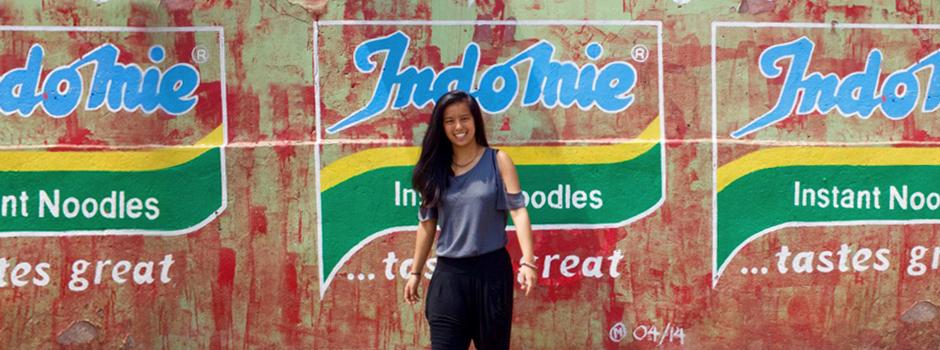From leading the dance club and bringing the International Genetically Engineered Machine (iGEM) competition to NYU Shanghai, to studying biomedical engineering in New York and reproductive health in Accra, Ghana, Ann Fan Yang ’17 has spent the past four years making the most of her NYU Shanghai experience. As she looks forward to starting graduate studies at Cambridge University in the fall, the biology major shares what drove her to pursue medicine and how NYU Shanghai helped cultivate her leadership skills.
It was an incident during a volunteer placement at the Indonesian Wakatobi National Park in her sophomore year that shifted Ann’s career path from marine biology to a pre-med track.
“One day while I was working on the island, several children hurried me over to help a man who’d been stung by a poisonous lionfish. Unable to assist, I scrambled to find the local doctor, who knew right away how to treat him,” she recalls. “The more time I spent observing the clinic at the park, the more I found myself looking up to the doctors and midwives working there. I still love marine biology, but I knew I wanted to have a more direct impact on saving human lives.”
The 21-year-old from Portland, Oregon, is now a step closer to that aim after being accepted to a master’s program in Translational Biomedical Research at Cambridge University that combines both her passions.
Marine biology holds a realm of possibility for creative medical solutions, according to Yang. While studying away in New York, she was inspired by how a biomaterials lab was using coral to 3D print bone tissue. “Biology can continue to inspire us by mimicking not just humans but also other aspects of nature that do well in the medical field.”
During her junior year study-away semester, Ann also collaborated on a biomedical engineering project that aimed to improve the postoperative monitoring process.

“We had the opportunity to work with plastic surgeons from NYU Langone. The goal was to detect blood flow complications earlier on, reduce the need for hourly disturbances, and be more accessible to surgeons.”
The exposure to collaborative lab environments merging engineering, medicine and business dates back to the summer of Ann’s freshman year, when she joined Genspace, a community biolab in New York that provides an open learning space for science innovation at the grassroots level.
Ann returned to campus compelled to bring together a community of students “in the name of fun science.” That is how she decided to get NYU Shanghai involved in the global iGEM (international genetic engineering machine) competition--one of her proudest accomplishments.
Eventually, Ann and her teammates took home a silver medal at the 12th annual Giant iGem Jamboree in Boston in September 2015 for a project that translated the color and positions of bacteria colonies on a plate into sound composition. They also organized an iGEM show at the Shanghai Science and Technology Museum in August 2015, inviting seven other university teams to present projects.
Now, Ann and her colleagues are focusing on synthetic biology, reaching out to other universities, designing projects. Independent of Ann, the team plans to spend summer days in the lab to test out ideas. “The fact that we have a sustainable initiative is great,” she said.
On campus, Ann also found herself taking the lead as president of the dance club and confided that she never would have considered herself a leader coming in freshman year.
“Dance club was probably my first step into being comfortable with that idea. At NYU Shanghai, interacting with classmates from all over the world, I felt their momentum and energy to create was infectious.”
Ann said long conversations on biotech startups with Professor Jonathan Kuhn, as his only Microbiology student, and constant run-ins with friends on campus are among what she will miss the most after graduating.
“I love NYU Shanghai’s international atmosphere as well its pioneering spirit. Everything you aspire to accomplish depends on your drive and initiative to work hard for it.”



